A Detailed Report on Entrepreneurship and Small Business Management
VerifiedAdded on 2021/02/21
|10
|2258
|33
Report
AI Summary
This report on entrepreneurship and small business management provides a comprehensive overview of the subject. It begins with an introduction to entrepreneurship, defining its key aspects and the role of a consultancy firm, Make It Work, chosen as a case study. The report then delves into different types of entrepreneurial ventures and their relationship to typology, along with a discussion on the similarities and differences between these ventures. It further analyzes relevant data and statistics to illustrate the impact of micro and small businesses on the economy, as well as the importance of such businesses and startups for the growth of the social economy. A significant portion of the report is dedicated to the characteristic traits and skills of successful entrepreneurs, including case studies of Henry Ford and Bill Gates. It then explores the aspects of entrepreneurial personality, reflecting on motivation and mindset using the OCEAN model. Finally, the report examines how background and experience can both hinder and foster entrepreneurship, using the examples of Henry Ford and Bill Gates. The report concludes with a summary of the key findings and a list of references.
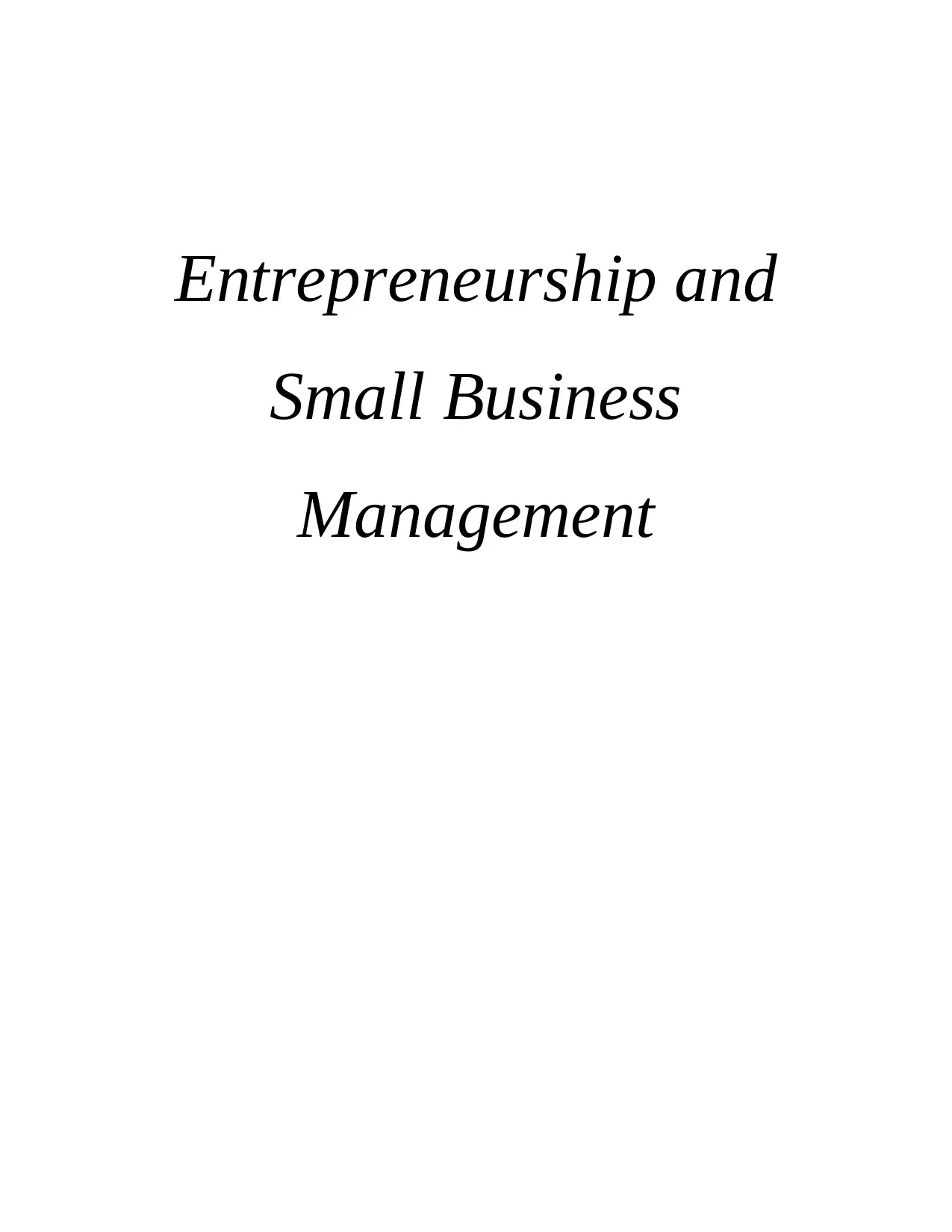
Entrepreneurship and
Small Business
Management
Small Business
Management
Paraphrase This Document
Need a fresh take? Get an instant paraphrase of this document with our AI Paraphraser
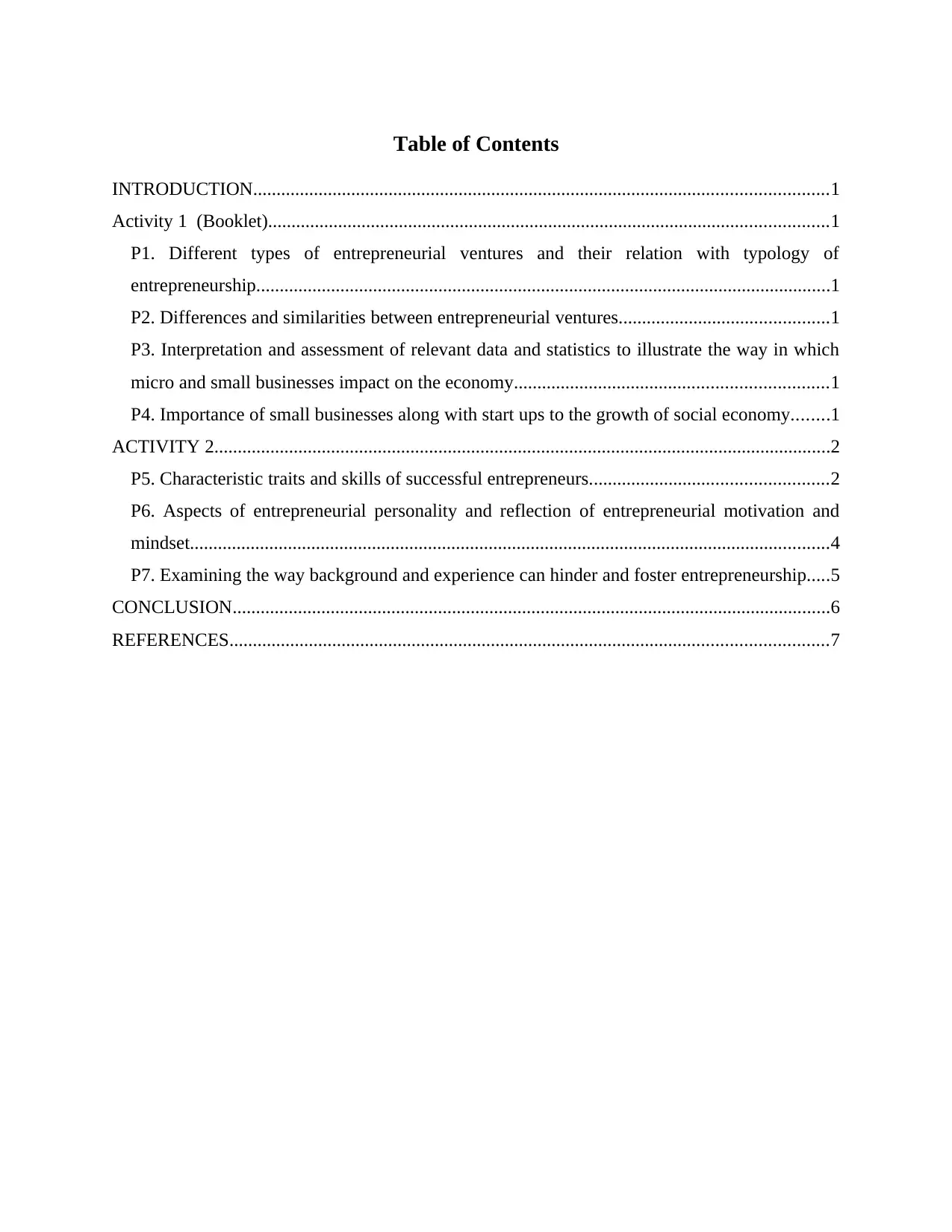
Table of Contents
INTRODUCTION...........................................................................................................................1
Activity 1 (Booklet)........................................................................................................................1
P1. Different types of entrepreneurial ventures and their relation with typology of
entrepreneurship...........................................................................................................................1
P2. Differences and similarities between entrepreneurial ventures.............................................1
P3. Interpretation and assessment of relevant data and statistics to illustrate the way in which
micro and small businesses impact on the economy...................................................................1
P4. Importance of small businesses along with start ups to the growth of social economy........1
ACTIVITY 2....................................................................................................................................2
P5. Characteristic traits and skills of successful entrepreneurs...................................................2
P6. Aspects of entrepreneurial personality and reflection of entrepreneurial motivation and
mindset.........................................................................................................................................4
P7. Examining the way background and experience can hinder and foster entrepreneurship.....5
CONCLUSION................................................................................................................................6
REFERENCES................................................................................................................................7
INTRODUCTION...........................................................................................................................1
Activity 1 (Booklet)........................................................................................................................1
P1. Different types of entrepreneurial ventures and their relation with typology of
entrepreneurship...........................................................................................................................1
P2. Differences and similarities between entrepreneurial ventures.............................................1
P3. Interpretation and assessment of relevant data and statistics to illustrate the way in which
micro and small businesses impact on the economy...................................................................1
P4. Importance of small businesses along with start ups to the growth of social economy........1
ACTIVITY 2....................................................................................................................................2
P5. Characteristic traits and skills of successful entrepreneurs...................................................2
P6. Aspects of entrepreneurial personality and reflection of entrepreneurial motivation and
mindset.........................................................................................................................................4
P7. Examining the way background and experience can hinder and foster entrepreneurship.....5
CONCLUSION................................................................................................................................6
REFERENCES................................................................................................................................7

⊘ This is a preview!⊘
Do you want full access?
Subscribe today to unlock all pages.

Trusted by 1+ million students worldwide
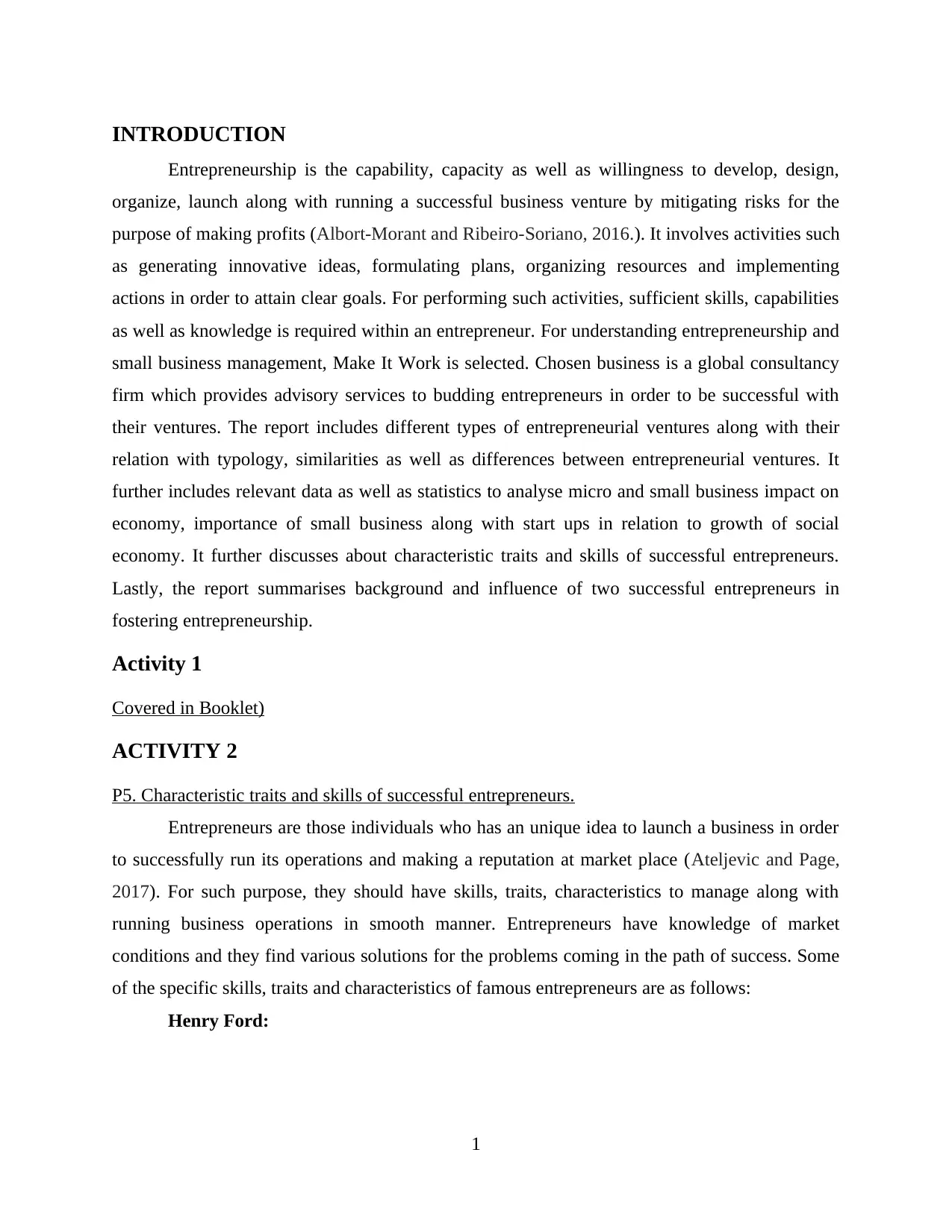
INTRODUCTION
Entrepreneurship is the capability, capacity as well as willingness to develop, design,
organize, launch along with running a successful business venture by mitigating risks for the
purpose of making profits (Albort-Morant and Ribeiro-Soriano, 2016.). It involves activities such
as generating innovative ideas, formulating plans, organizing resources and implementing
actions in order to attain clear goals. For performing such activities, sufficient skills, capabilities
as well as knowledge is required within an entrepreneur. For understanding entrepreneurship and
small business management, Make It Work is selected. Chosen business is a global consultancy
firm which provides advisory services to budding entrepreneurs in order to be successful with
their ventures. The report includes different types of entrepreneurial ventures along with their
relation with typology, similarities as well as differences between entrepreneurial ventures. It
further includes relevant data as well as statistics to analyse micro and small business impact on
economy, importance of small business along with start ups in relation to growth of social
economy. It further discusses about characteristic traits and skills of successful entrepreneurs.
Lastly, the report summarises background and influence of two successful entrepreneurs in
fostering entrepreneurship.
Activity 1
Covered in Booklet)
ACTIVITY 2
P5. Characteristic traits and skills of successful entrepreneurs.
Entrepreneurs are those individuals who has an unique idea to launch a business in order
to successfully run its operations and making a reputation at market place (Ateljevic and Page,
2017). For such purpose, they should have skills, traits, characteristics to manage along with
running business operations in smooth manner. Entrepreneurs have knowledge of market
conditions and they find various solutions for the problems coming in the path of success. Some
of the specific skills, traits and characteristics of famous entrepreneurs are as follows:
Henry Ford:
1
Entrepreneurship is the capability, capacity as well as willingness to develop, design,
organize, launch along with running a successful business venture by mitigating risks for the
purpose of making profits (Albort-Morant and Ribeiro-Soriano, 2016.). It involves activities such
as generating innovative ideas, formulating plans, organizing resources and implementing
actions in order to attain clear goals. For performing such activities, sufficient skills, capabilities
as well as knowledge is required within an entrepreneur. For understanding entrepreneurship and
small business management, Make It Work is selected. Chosen business is a global consultancy
firm which provides advisory services to budding entrepreneurs in order to be successful with
their ventures. The report includes different types of entrepreneurial ventures along with their
relation with typology, similarities as well as differences between entrepreneurial ventures. It
further includes relevant data as well as statistics to analyse micro and small business impact on
economy, importance of small business along with start ups in relation to growth of social
economy. It further discusses about characteristic traits and skills of successful entrepreneurs.
Lastly, the report summarises background and influence of two successful entrepreneurs in
fostering entrepreneurship.
Activity 1
Covered in Booklet)
ACTIVITY 2
P5. Characteristic traits and skills of successful entrepreneurs.
Entrepreneurs are those individuals who has an unique idea to launch a business in order
to successfully run its operations and making a reputation at market place (Ateljevic and Page,
2017). For such purpose, they should have skills, traits, characteristics to manage along with
running business operations in smooth manner. Entrepreneurs have knowledge of market
conditions and they find various solutions for the problems coming in the path of success. Some
of the specific skills, traits and characteristics of famous entrepreneurs are as follows:
Henry Ford:
1
Paraphrase This Document
Need a fresh take? Get an instant paraphrase of this document with our AI Paraphraser
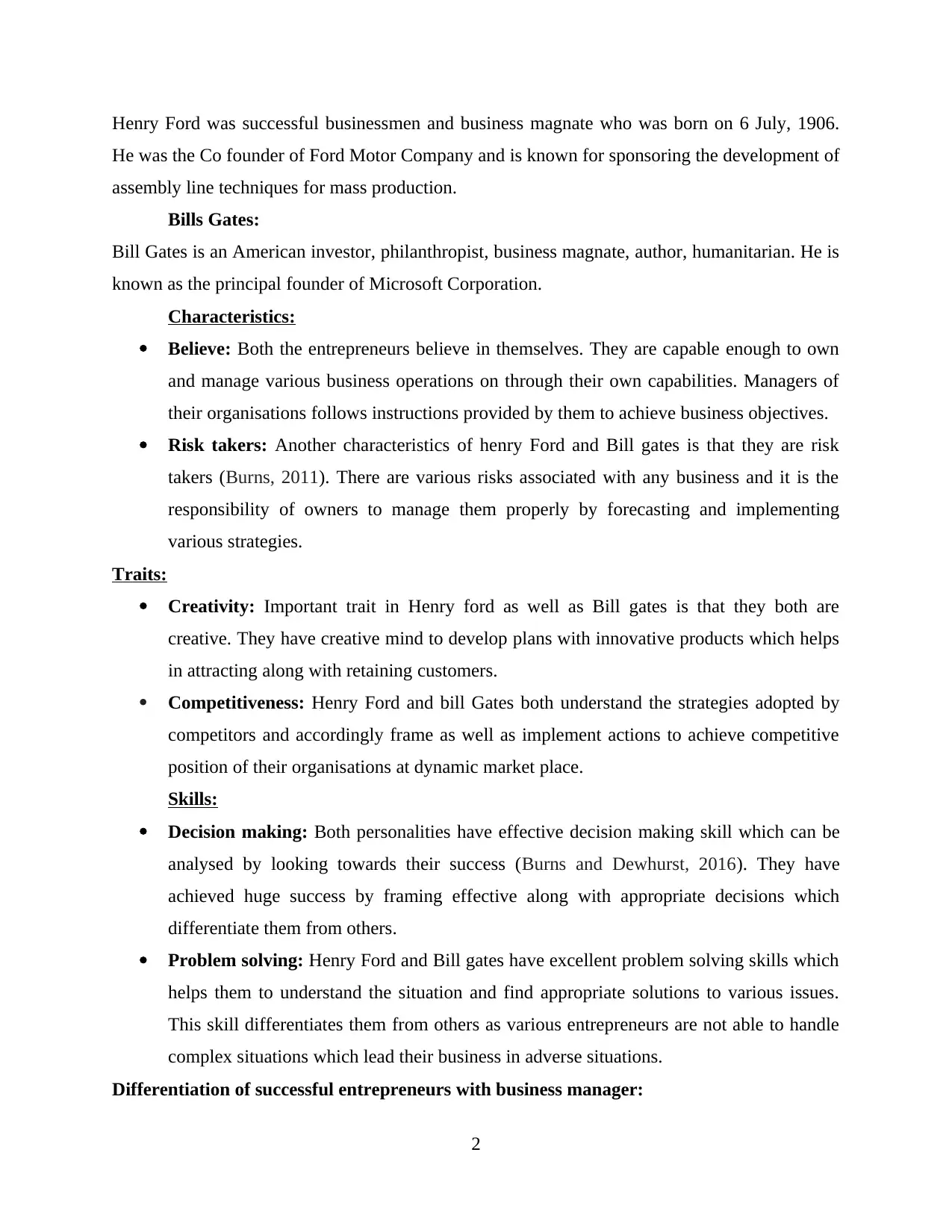
Henry Ford was successful businessmen and business magnate who was born on 6 July, 1906.
He was the Co founder of Ford Motor Company and is known for sponsoring the development of
assembly line techniques for mass production.
Bills Gates:
Bill Gates is an American investor, philanthropist, business magnate, author, humanitarian. He is
known as the principal founder of Microsoft Corporation.
Characteristics:
Believe: Both the entrepreneurs believe in themselves. They are capable enough to own
and manage various business operations on through their own capabilities. Managers of
their organisations follows instructions provided by them to achieve business objectives.
Risk takers: Another characteristics of henry Ford and Bill gates is that they are risk
takers (Burns, 2011). There are various risks associated with any business and it is the
responsibility of owners to manage them properly by forecasting and implementing
various strategies.
Traits:
Creativity: Important trait in Henry ford as well as Bill gates is that they both are
creative. They have creative mind to develop plans with innovative products which helps
in attracting along with retaining customers.
Competitiveness: Henry Ford and bill Gates both understand the strategies adopted by
competitors and accordingly frame as well as implement actions to achieve competitive
position of their organisations at dynamic market place.
Skills:
Decision making: Both personalities have effective decision making skill which can be
analysed by looking towards their success (Burns and Dewhurst, 2016). They have
achieved huge success by framing effective along with appropriate decisions which
differentiate them from others.
Problem solving: Henry Ford and Bill gates have excellent problem solving skills which
helps them to understand the situation and find appropriate solutions to various issues.
This skill differentiates them from others as various entrepreneurs are not able to handle
complex situations which lead their business in adverse situations.
Differentiation of successful entrepreneurs with business manager:
2
He was the Co founder of Ford Motor Company and is known for sponsoring the development of
assembly line techniques for mass production.
Bills Gates:
Bill Gates is an American investor, philanthropist, business magnate, author, humanitarian. He is
known as the principal founder of Microsoft Corporation.
Characteristics:
Believe: Both the entrepreneurs believe in themselves. They are capable enough to own
and manage various business operations on through their own capabilities. Managers of
their organisations follows instructions provided by them to achieve business objectives.
Risk takers: Another characteristics of henry Ford and Bill gates is that they are risk
takers (Burns, 2011). There are various risks associated with any business and it is the
responsibility of owners to manage them properly by forecasting and implementing
various strategies.
Traits:
Creativity: Important trait in Henry ford as well as Bill gates is that they both are
creative. They have creative mind to develop plans with innovative products which helps
in attracting along with retaining customers.
Competitiveness: Henry Ford and bill Gates both understand the strategies adopted by
competitors and accordingly frame as well as implement actions to achieve competitive
position of their organisations at dynamic market place.
Skills:
Decision making: Both personalities have effective decision making skill which can be
analysed by looking towards their success (Burns and Dewhurst, 2016). They have
achieved huge success by framing effective along with appropriate decisions which
differentiate them from others.
Problem solving: Henry Ford and Bill gates have excellent problem solving skills which
helps them to understand the situation and find appropriate solutions to various issues.
This skill differentiates them from others as various entrepreneurs are not able to handle
complex situations which lead their business in adverse situations.
Differentiation of successful entrepreneurs with business manager:
2
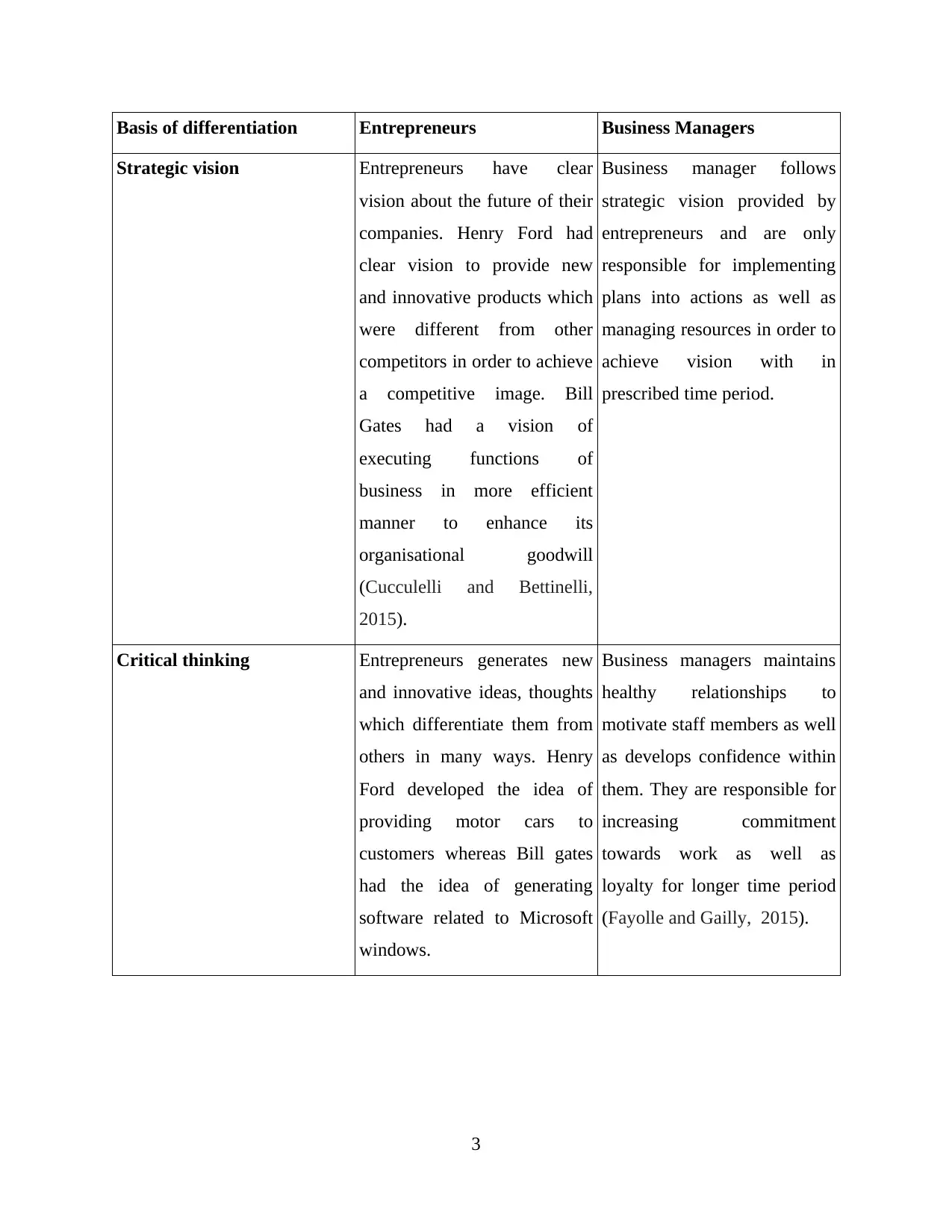
Basis of differentiation Entrepreneurs Business Managers
Strategic vision Entrepreneurs have clear
vision about the future of their
companies. Henry Ford had
clear vision to provide new
and innovative products which
were different from other
competitors in order to achieve
a competitive image. Bill
Gates had a vision of
executing functions of
business in more efficient
manner to enhance its
organisational goodwill
(Cucculelli and Bettinelli,
2015).
Business manager follows
strategic vision provided by
entrepreneurs and are only
responsible for implementing
plans into actions as well as
managing resources in order to
achieve vision with in
prescribed time period.
Critical thinking Entrepreneurs generates new
and innovative ideas, thoughts
which differentiate them from
others in many ways. Henry
Ford developed the idea of
providing motor cars to
customers whereas Bill gates
had the idea of generating
software related to Microsoft
windows.
Business managers maintains
healthy relationships to
motivate staff members as well
as develops confidence within
them. They are responsible for
increasing commitment
towards work as well as
loyalty for longer time period
(Fayolle and Gailly, 2015).
3
Strategic vision Entrepreneurs have clear
vision about the future of their
companies. Henry Ford had
clear vision to provide new
and innovative products which
were different from other
competitors in order to achieve
a competitive image. Bill
Gates had a vision of
executing functions of
business in more efficient
manner to enhance its
organisational goodwill
(Cucculelli and Bettinelli,
2015).
Business manager follows
strategic vision provided by
entrepreneurs and are only
responsible for implementing
plans into actions as well as
managing resources in order to
achieve vision with in
prescribed time period.
Critical thinking Entrepreneurs generates new
and innovative ideas, thoughts
which differentiate them from
others in many ways. Henry
Ford developed the idea of
providing motor cars to
customers whereas Bill gates
had the idea of generating
software related to Microsoft
windows.
Business managers maintains
healthy relationships to
motivate staff members as well
as develops confidence within
them. They are responsible for
increasing commitment
towards work as well as
loyalty for longer time period
(Fayolle and Gailly, 2015).
3
⊘ This is a preview!⊘
Do you want full access?
Subscribe today to unlock all pages.

Trusted by 1+ million students worldwide
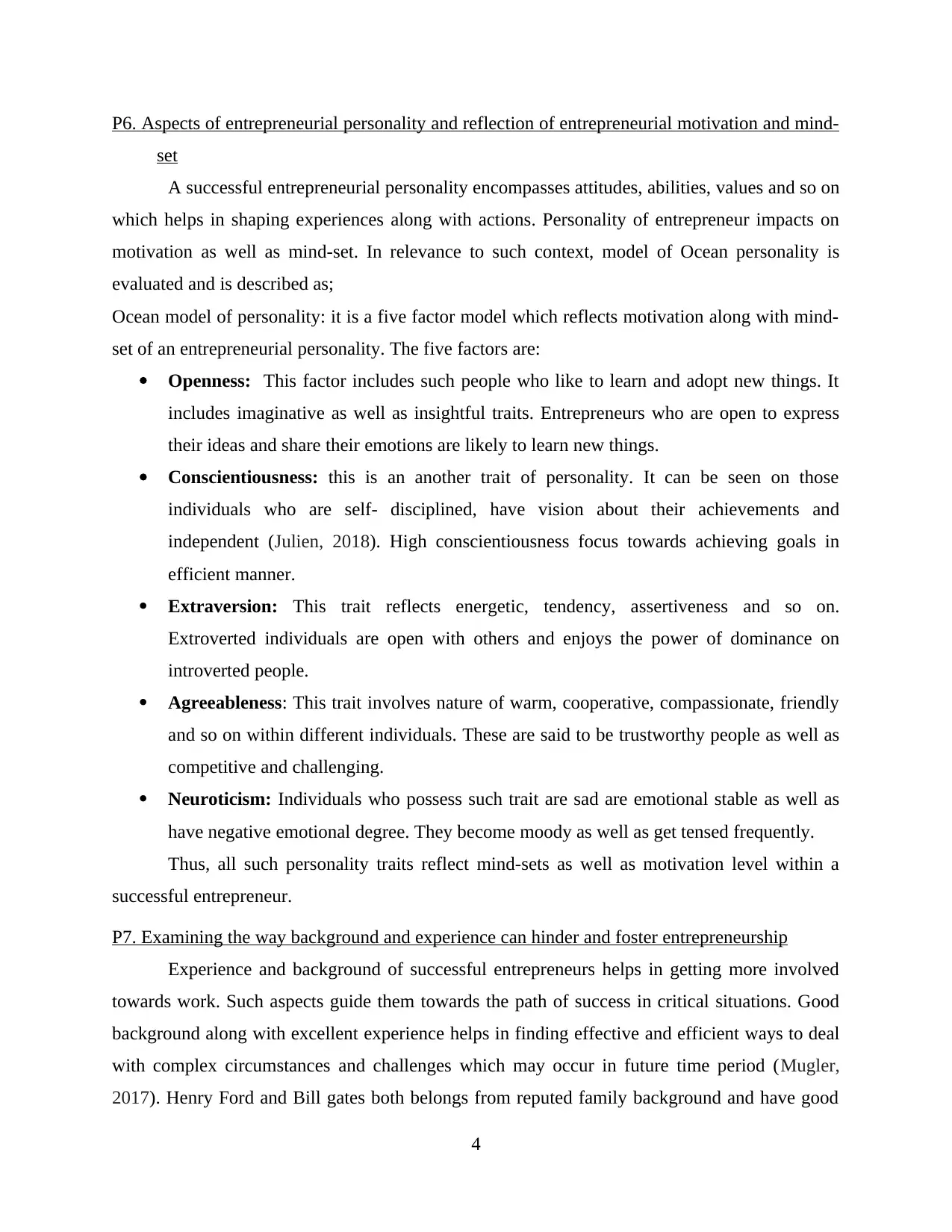
P6. Aspects of entrepreneurial personality and reflection of entrepreneurial motivation and mind-
set
A successful entrepreneurial personality encompasses attitudes, abilities, values and so on
which helps in shaping experiences along with actions. Personality of entrepreneur impacts on
motivation as well as mind-set. In relevance to such context, model of Ocean personality is
evaluated and is described as;
Ocean model of personality: it is a five factor model which reflects motivation along with mind-
set of an entrepreneurial personality. The five factors are:
Openness: This factor includes such people who like to learn and adopt new things. It
includes imaginative as well as insightful traits. Entrepreneurs who are open to express
their ideas and share their emotions are likely to learn new things.
Conscientiousness: this is an another trait of personality. It can be seen on those
individuals who are self- disciplined, have vision about their achievements and
independent (Julien, 2018). High conscientiousness focus towards achieving goals in
efficient manner.
Extraversion: This trait reflects energetic, tendency, assertiveness and so on.
Extroverted individuals are open with others and enjoys the power of dominance on
introverted people.
Agreeableness: This trait involves nature of warm, cooperative, compassionate, friendly
and so on within different individuals. These are said to be trustworthy people as well as
competitive and challenging.
Neuroticism: Individuals who possess such trait are sad are emotional stable as well as
have negative emotional degree. They become moody as well as get tensed frequently.
Thus, all such personality traits reflect mind-sets as well as motivation level within a
successful entrepreneur.
P7. Examining the way background and experience can hinder and foster entrepreneurship
Experience and background of successful entrepreneurs helps in getting more involved
towards work. Such aspects guide them towards the path of success in critical situations. Good
background along with excellent experience helps in finding effective and efficient ways to deal
with complex circumstances and challenges which may occur in future time period (Mugler,
2017). Henry Ford and Bill gates both belongs from reputed family background and have good
4
set
A successful entrepreneurial personality encompasses attitudes, abilities, values and so on
which helps in shaping experiences along with actions. Personality of entrepreneur impacts on
motivation as well as mind-set. In relevance to such context, model of Ocean personality is
evaluated and is described as;
Ocean model of personality: it is a five factor model which reflects motivation along with mind-
set of an entrepreneurial personality. The five factors are:
Openness: This factor includes such people who like to learn and adopt new things. It
includes imaginative as well as insightful traits. Entrepreneurs who are open to express
their ideas and share their emotions are likely to learn new things.
Conscientiousness: this is an another trait of personality. It can be seen on those
individuals who are self- disciplined, have vision about their achievements and
independent (Julien, 2018). High conscientiousness focus towards achieving goals in
efficient manner.
Extraversion: This trait reflects energetic, tendency, assertiveness and so on.
Extroverted individuals are open with others and enjoys the power of dominance on
introverted people.
Agreeableness: This trait involves nature of warm, cooperative, compassionate, friendly
and so on within different individuals. These are said to be trustworthy people as well as
competitive and challenging.
Neuroticism: Individuals who possess such trait are sad are emotional stable as well as
have negative emotional degree. They become moody as well as get tensed frequently.
Thus, all such personality traits reflect mind-sets as well as motivation level within a
successful entrepreneur.
P7. Examining the way background and experience can hinder and foster entrepreneurship
Experience and background of successful entrepreneurs helps in getting more involved
towards work. Such aspects guide them towards the path of success in critical situations. Good
background along with excellent experience helps in finding effective and efficient ways to deal
with complex circumstances and challenges which may occur in future time period (Mugler,
2017). Henry Ford and Bill gates both belongs from reputed family background and have good
4
Paraphrase This Document
Need a fresh take? Get an instant paraphrase of this document with our AI Paraphraser
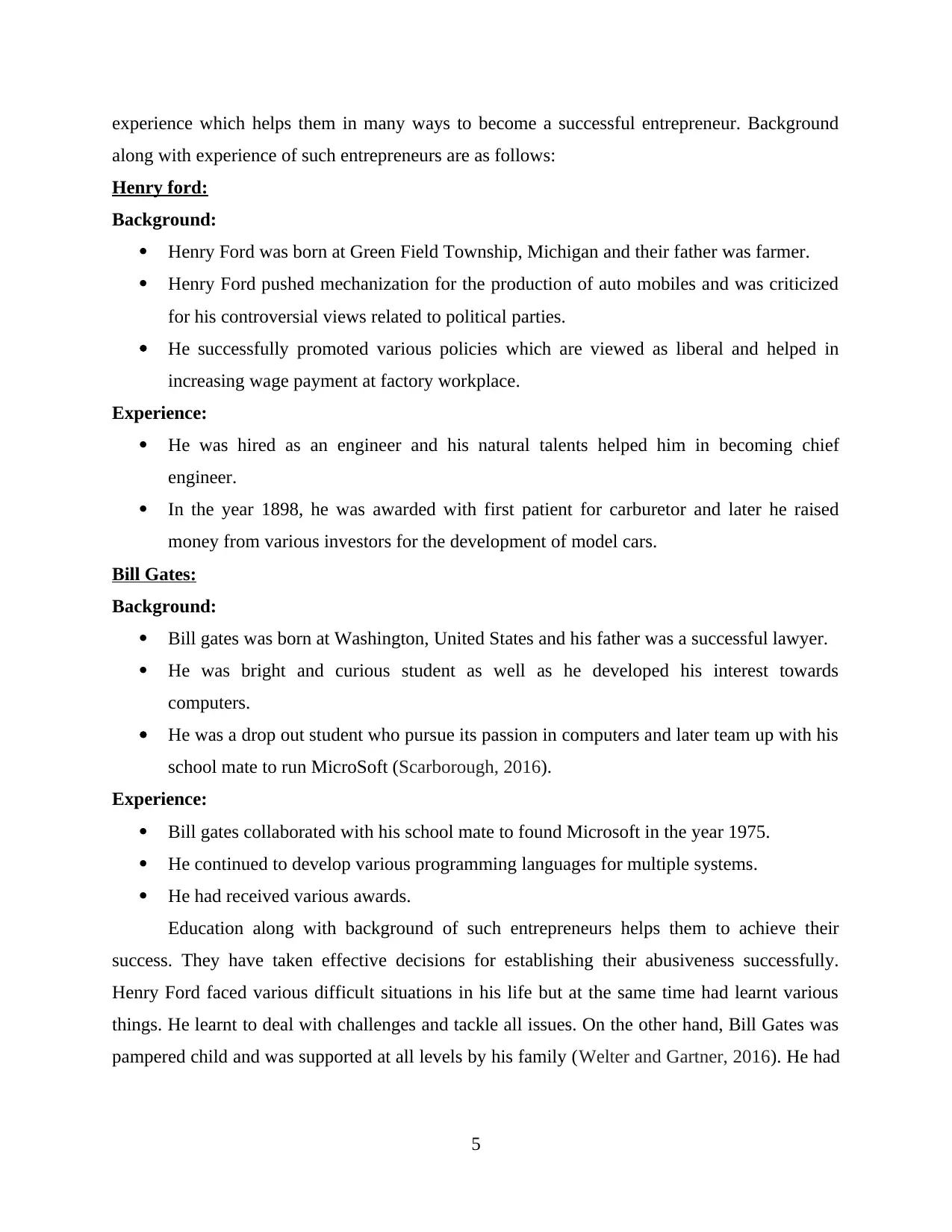
experience which helps them in many ways to become a successful entrepreneur. Background
along with experience of such entrepreneurs are as follows:
Henry ford:
Background:
Henry Ford was born at Green Field Township, Michigan and their father was farmer.
Henry Ford pushed mechanization for the production of auto mobiles and was criticized
for his controversial views related to political parties.
He successfully promoted various policies which are viewed as liberal and helped in
increasing wage payment at factory workplace.
Experience:
He was hired as an engineer and his natural talents helped him in becoming chief
engineer.
In the year 1898, he was awarded with first patient for carburetor and later he raised
money from various investors for the development of model cars.
Bill Gates:
Background:
Bill gates was born at Washington, United States and his father was a successful lawyer.
He was bright and curious student as well as he developed his interest towards
computers.
He was a drop out student who pursue its passion in computers and later team up with his
school mate to run MicroSoft (Scarborough, 2016).
Experience:
Bill gates collaborated with his school mate to found Microsoft in the year 1975.
He continued to develop various programming languages for multiple systems.
He had received various awards.
Education along with background of such entrepreneurs helps them to achieve their
success. They have taken effective decisions for establishing their abusiveness successfully.
Henry Ford faced various difficult situations in his life but at the same time had learnt various
things. He learnt to deal with challenges and tackle all issues. On the other hand, Bill Gates was
pampered child and was supported at all levels by his family (Welter and Gartner, 2016). He had
5
along with experience of such entrepreneurs are as follows:
Henry ford:
Background:
Henry Ford was born at Green Field Township, Michigan and their father was farmer.
Henry Ford pushed mechanization for the production of auto mobiles and was criticized
for his controversial views related to political parties.
He successfully promoted various policies which are viewed as liberal and helped in
increasing wage payment at factory workplace.
Experience:
He was hired as an engineer and his natural talents helped him in becoming chief
engineer.
In the year 1898, he was awarded with first patient for carburetor and later he raised
money from various investors for the development of model cars.
Bill Gates:
Background:
Bill gates was born at Washington, United States and his father was a successful lawyer.
He was bright and curious student as well as he developed his interest towards
computers.
He was a drop out student who pursue its passion in computers and later team up with his
school mate to run MicroSoft (Scarborough, 2016).
Experience:
Bill gates collaborated with his school mate to found Microsoft in the year 1975.
He continued to develop various programming languages for multiple systems.
He had received various awards.
Education along with background of such entrepreneurs helps them to achieve their
success. They have taken effective decisions for establishing their abusiveness successfully.
Henry Ford faced various difficult situations in his life but at the same time had learnt various
things. He learnt to deal with challenges and tackle all issues. On the other hand, Bill Gates was
pampered child and was supported at all levels by his family (Welter and Gartner, 2016). He had
5
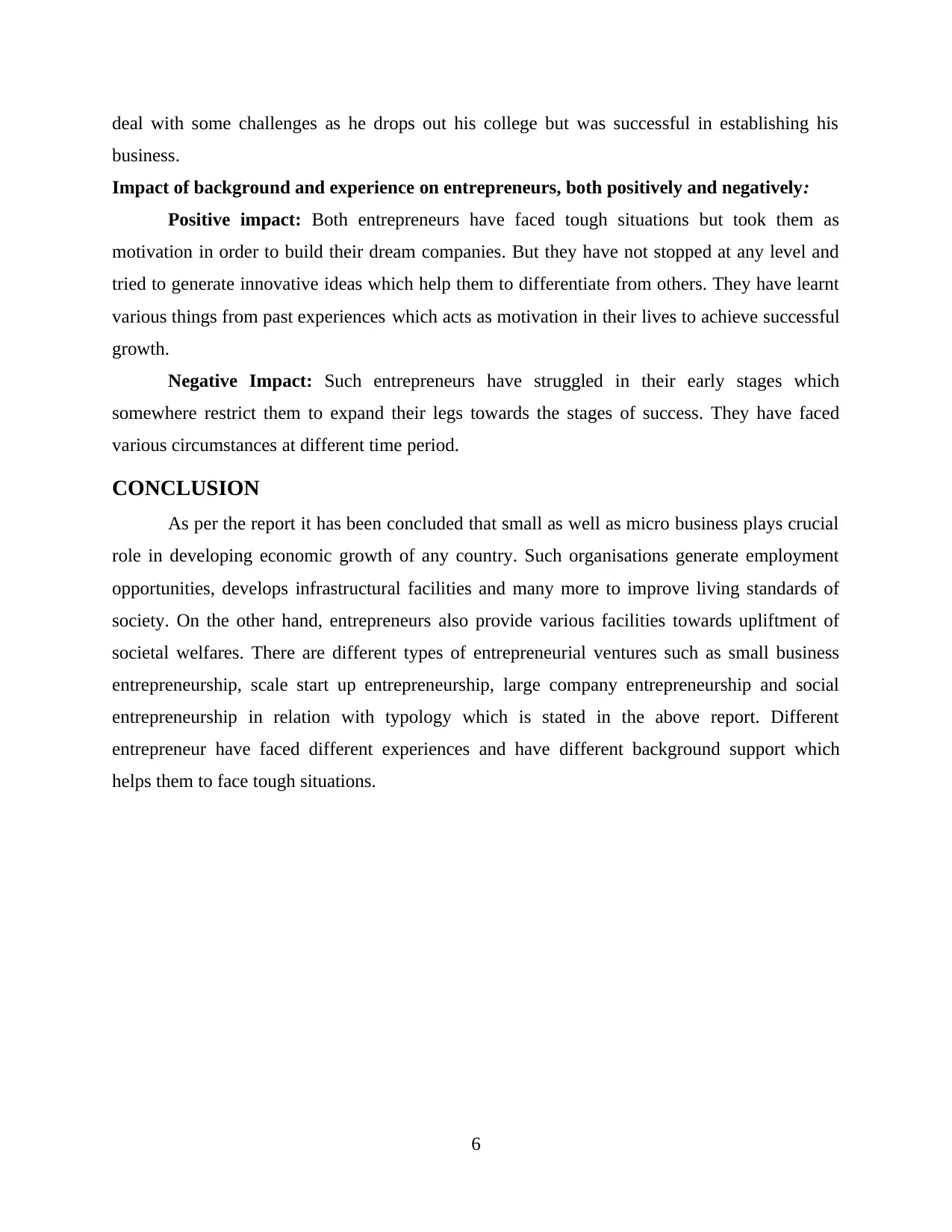
deal with some challenges as he drops out his college but was successful in establishing his
business.
Impact of background and experience on entrepreneurs, both positively and negatively:
Positive impact: Both entrepreneurs have faced tough situations but took them as
motivation in order to build their dream companies. But they have not stopped at any level and
tried to generate innovative ideas which help them to differentiate from others. They have learnt
various things from past experiences which acts as motivation in their lives to achieve successful
growth.
Negative Impact: Such entrepreneurs have struggled in their early stages which
somewhere restrict them to expand their legs towards the stages of success. They have faced
various circumstances at different time period.
CONCLUSION
As per the report it has been concluded that small as well as micro business plays crucial
role in developing economic growth of any country. Such organisations generate employment
opportunities, develops infrastructural facilities and many more to improve living standards of
society. On the other hand, entrepreneurs also provide various facilities towards upliftment of
societal welfares. There are different types of entrepreneurial ventures such as small business
entrepreneurship, scale start up entrepreneurship, large company entrepreneurship and social
entrepreneurship in relation with typology which is stated in the above report. Different
entrepreneur have faced different experiences and have different background support which
helps them to face tough situations.
6
business.
Impact of background and experience on entrepreneurs, both positively and negatively:
Positive impact: Both entrepreneurs have faced tough situations but took them as
motivation in order to build their dream companies. But they have not stopped at any level and
tried to generate innovative ideas which help them to differentiate from others. They have learnt
various things from past experiences which acts as motivation in their lives to achieve successful
growth.
Negative Impact: Such entrepreneurs have struggled in their early stages which
somewhere restrict them to expand their legs towards the stages of success. They have faced
various circumstances at different time period.
CONCLUSION
As per the report it has been concluded that small as well as micro business plays crucial
role in developing economic growth of any country. Such organisations generate employment
opportunities, develops infrastructural facilities and many more to improve living standards of
society. On the other hand, entrepreneurs also provide various facilities towards upliftment of
societal welfares. There are different types of entrepreneurial ventures such as small business
entrepreneurship, scale start up entrepreneurship, large company entrepreneurship and social
entrepreneurship in relation with typology which is stated in the above report. Different
entrepreneur have faced different experiences and have different background support which
helps them to face tough situations.
6
⊘ This is a preview!⊘
Do you want full access?
Subscribe today to unlock all pages.

Trusted by 1+ million students worldwide
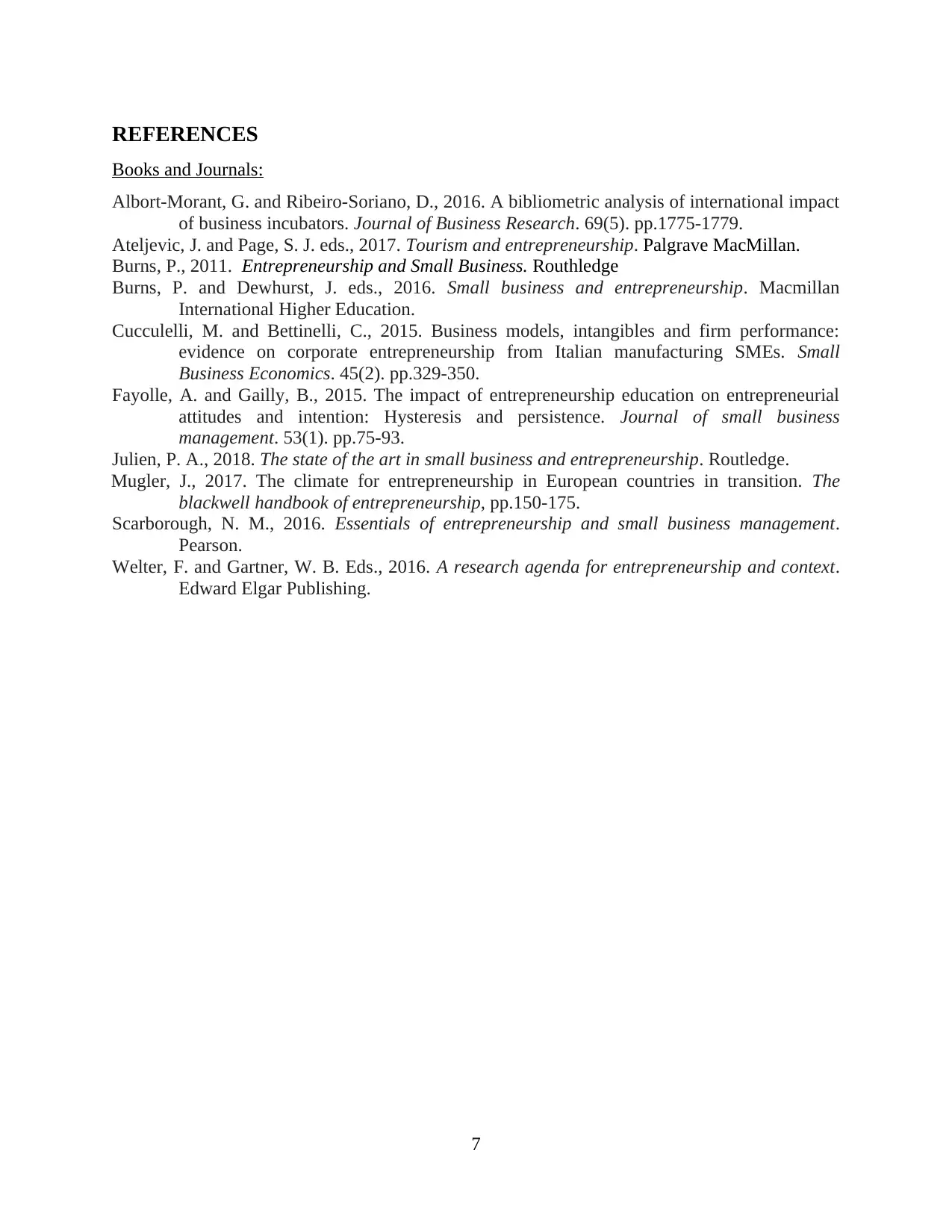
REFERENCES
Books and Journals:
Albort-Morant, G. and Ribeiro-Soriano, D., 2016. A bibliometric analysis of international impact
of business incubators. Journal of Business Research. 69(5). pp.1775-1779.
Ateljevic, J. and Page, S. J. eds., 2017. Tourism and entrepreneurship. Palgrave MacMillan.
Burns, P., 2011. Entrepreneurship and Small Business. Routhledge
Burns, P. and Dewhurst, J. eds., 2016. Small business and entrepreneurship. Macmillan
International Higher Education.
Cucculelli, M. and Bettinelli, C., 2015. Business models, intangibles and firm performance:
evidence on corporate entrepreneurship from Italian manufacturing SMEs. Small
Business Economics. 45(2). pp.329-350.
Fayolle, A. and Gailly, B., 2015. The impact of entrepreneurship education on entrepreneurial
attitudes and intention: Hysteresis and persistence. Journal of small business
management. 53(1). pp.75-93.
Julien, P. A., 2018. The state of the art in small business and entrepreneurship. Routledge.
Mugler, J., 2017. The climate for entrepreneurship in European countries in transition. The
blackwell handbook of entrepreneurship, pp.150-175.
Scarborough, N. M., 2016. Essentials of entrepreneurship and small business management.
Pearson.
Welter, F. and Gartner, W. B. Eds., 2016. A research agenda for entrepreneurship and context.
Edward Elgar Publishing.
7
Books and Journals:
Albort-Morant, G. and Ribeiro-Soriano, D., 2016. A bibliometric analysis of international impact
of business incubators. Journal of Business Research. 69(5). pp.1775-1779.
Ateljevic, J. and Page, S. J. eds., 2017. Tourism and entrepreneurship. Palgrave MacMillan.
Burns, P., 2011. Entrepreneurship and Small Business. Routhledge
Burns, P. and Dewhurst, J. eds., 2016. Small business and entrepreneurship. Macmillan
International Higher Education.
Cucculelli, M. and Bettinelli, C., 2015. Business models, intangibles and firm performance:
evidence on corporate entrepreneurship from Italian manufacturing SMEs. Small
Business Economics. 45(2). pp.329-350.
Fayolle, A. and Gailly, B., 2015. The impact of entrepreneurship education on entrepreneurial
attitudes and intention: Hysteresis and persistence. Journal of small business
management. 53(1). pp.75-93.
Julien, P. A., 2018. The state of the art in small business and entrepreneurship. Routledge.
Mugler, J., 2017. The climate for entrepreneurship in European countries in transition. The
blackwell handbook of entrepreneurship, pp.150-175.
Scarborough, N. M., 2016. Essentials of entrepreneurship and small business management.
Pearson.
Welter, F. and Gartner, W. B. Eds., 2016. A research agenda for entrepreneurship and context.
Edward Elgar Publishing.
7
1 out of 10
Related Documents
Your All-in-One AI-Powered Toolkit for Academic Success.
+13062052269
info@desklib.com
Available 24*7 on WhatsApp / Email
![[object Object]](/_next/static/media/star-bottom.7253800d.svg)
Unlock your academic potential
Copyright © 2020–2026 A2Z Services. All Rights Reserved. Developed and managed by ZUCOL.





